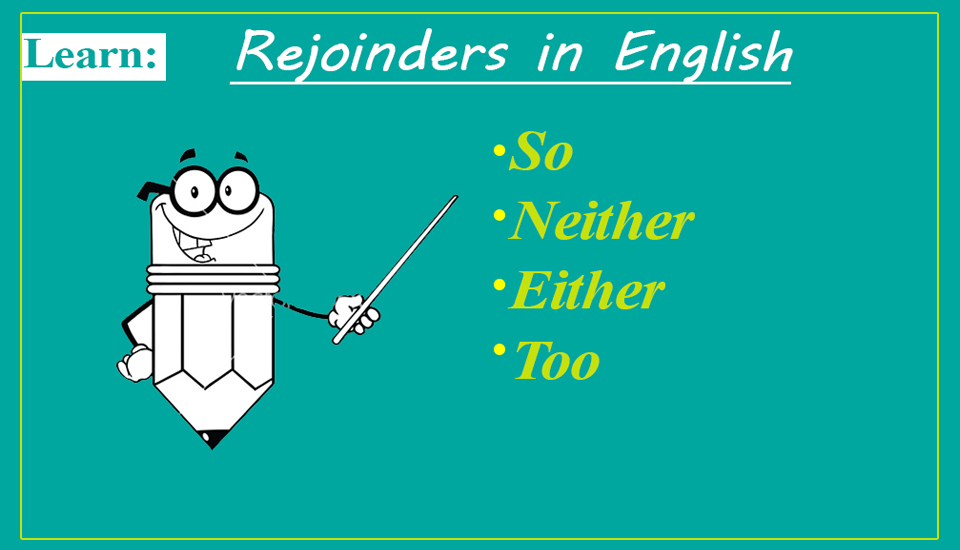We often use the words like (So, Neither, Too and Either) in our daily conversation. These words are used in rejoinders. In this lesson you will learn what rejoinders in English Grammar are.

Rejoinders in English
Rejoinder is a quick reply that is often sharp or witty, or is a legal term referring to a defendant’s answer to a plaintiff’s legal action.
SO
We use “So” when we agree with affirmative statements or to say that a positive sentence is also true for us.
- I am an army officer. (So am I).
- I want a piece of bread. (So do I).
- They should come early. (So should I).
- They have done their homework. (So have I).
Note: The verb after ‘so’ or ‘neither’ changes and it depends on the tense of the verb (To be/Have) in first sentence. (This is similar as Tag Questions).
NEITHER:
We use “neither” when we agree with negative statements or to say that a negative sentence is also true for us.
- She cannot play well. (Neither can I).
- She does not like an apple. (Neither does Ali).
- You couldn’t compete them. (Neither could they).
- We hadn’t played on this ground before. (Neither had we).
IMPORTAN:
These rejoinders are used as reply to someone else but, both sentences can also be said by the same person. Consider the examples below:
- Me: He has not brought his fee today and neither have I.
- Me: She loves her parents. So do I.
Too and Either:
Too: We can use ‘Too’ at the end of a sentence to show agreement with positive statements. It’s similar to using ‘So’.
- I am tired. (So am I. = I am tired too).
- They have done their assignments. (So have we. = We have done too).
- She can swim. (So can I. = I can swim too).
- You look attractive today. (So does Sara. = She looks attractive too).
Either: We can use either at the end of sentence to show agreement with negative statements; it’s similar as using ‘Neither’ but neither is more commonly used in spoken English. (Remember, you need a negative verb with ‘either’).
- They don’t come late. (Neither do I. = I don’t come late either).
- I wouldn’t play in the final. (Neither would I. = I wouldn’t play either).
- She won’t pass the test. (Neither will you. = You won’t pass either).
- He hasn’t broken the glasses. (Neither have I. = I haven’t broken either).
Rejoinders may also take the form of follow-up questions. Note how they are used in the following situations.
- Today the teacher won’t take the class. (He will)?
- I am going to USA. (You will? / Oh really)?
Exercises: Try the exercise below about using rejoinders.
Agree or disagree with the following statements.
- I can’t play the game.
- She does her homework
- You are so lazy.
- She is cooking her favorite dish.
- Ali and Raza want to fight.
- He didn’t know English.SR
- They have not gone to Karachi.
- We can defeat them.
- They wanted some apples.
- He is going to go to Bazar.

2 comments
This information was very useful for me and my students. Thank you!
It is really necessary grammar. and the way you have explained is really good.